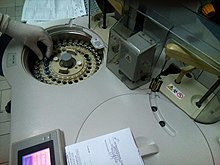Analysis
This article has multiple issues. Please help improve it or discuss these issues on the talk page. (Learn how and when to remove these template messages)
|

| Part of a series on |
| Research |
|---|
 |
| Philosophy portal |
Analysis (pl.: analyses) is the process of breaking a
The word comes from the Ancient Greek ἀνάλυσις (analysis, "a breaking-up" or "an untying;" from ana- "up, throughout" and lysis "a loosening").[2] From it also comes the word's plural, analyses.
As a formal concept, the method has variously been ascribed to
The converse of analysis is synthesis: putting the pieces back together again in a new or different whole.
Science and technology
Chemistry

The field of
Types of Analysis
A) Qualitative Analysis: It is concerned with which components are in a given sample or compound.
Example: Precipitation reaction
B) Quantitative Analysis: It is to determine the quantity of individual component present in a given sample or compound.
Example: To find concentration by uv-spectrophotometer.
Isotopes
Chemists can use
Computer science
- Requirements analysis – encompasses those tasks that go into determining the needs or conditions to meet for a new or altered product, taking account of the possibly conflicting requirements of the various stakeholders, such as beneficiaries or users.
- Competitive analysis (online algorithm) – shows how online algorithms perform and demonstrates the power of randomization in algorithms
- Lexical analysis – the process of processing an input sequence of characters and producing as output a sequence of symbols
- Object-oriented analysis and design – à la Booch
- Program analysis (computer science)– the process of automatically analysing the behavior of computer programs
- Semantic analysis (computer science)– a pass by a compiler that adds semantical information to the parse tree and performs certain checks
- Static code analysis– the analysis of computer software that is performed without actually executing programs built from that
- Yourdon
- Syntax analysis– a process in compilers that recognizes the structure of programming languages, also known as parsing
- Worst-case execution time – determines the longest time that a piece of software can take to run
Engineering
Analysts in the field of
Mathematics
Modern mathematical analysis is the study of infinite processes. It is the branch of mathematics that includes calculus. It can be applied in the study of
Florian Cajori explains in A History of Mathematics (1893) the difference between modern and ancient mathematical analysis, as distinct from logical analysis, as follows:
The terms synthesis and analysis are used in mathematics in a more special sense than in logic. In ancient mathematics they had a different meaning from what they now have. The oldest definition of mathematical analysis as opposed to synthesis is that given in [appended to] Euclid, XIII. 5, which in all probability was framed by Eudoxus: "Analysis is the obtaining of the thing sought by assuming it and so reasoning up to an admitted truth; synthesis is the obtaining of the thing sought by reasoning up to the inference and proof of it."
The analytic method is not conclusive, unless all operations involved in it are known to be reversible. To remove all doubt, the Greeks, as a rule, added to the analytic process a synthetic one, consisting of a reversion of all operations occurring in the analysis. Thus the aim of analysis was to aid in the discovery of synthetic proofs or solutions.
James Gow uses a similar argument as Cajori, with the following clarification, in his A Short History of Greek Mathematics (1884):
The synthetic proof proceeds by shewing that the proposed new truth involves certain admitted truths. An analytic proof begins by an assumption, upon which a synthetic reasoning is founded. The Greeks distinguished theoretic from problematic analysis. A theoretic analysis is of the following kind. To prove that A is B, assume first that A is B. If so, then, since B is C and C is D and D is E, therefore A is E. If this be known a falsity, A is not B. But if this be a known truth and all the intermediate propositions be convertible, then the reverse process, A is E, E is D, D is C, C is B, therefore A is B, constitutes a synthetic proof of the original theorem. Problematic analysis is applied in all cases where it is proposed to construct a figure which is assumed to satisfy a given condition. The problem is then converted into some theorem which is involved in the condition and which is proved synthetically, and the steps of this synthetic proof taken backwards are a synthetic solution of the problem.
Psychotherapy
- Psychoanalysis – seeks to elucidate connections among unconscious components of patients' mental processes
- Transactional analysis
- Transactional analysis is used by therapists to try to gain a better understanding of the unconscious. It focuses on understanding and intervening human behavior.[7]
Signal processing
- Finite element analysis– a computer simulation technique used in engineering analysis
- Independent component analysis
- Link quality analysis – the analysis of signal quality
- Path quality analysis
- Fourier analysis
Statistics
In statistics, the term analysis may refer to any method used for data analysis. Among the many such methods, some are:
- Analysis of variance (ANOVA) – a collection of statistical models and their associated procedures which compare means by splitting the overall observed variance into different parts
- Boolean analysis – a method to find deterministic dependencies between variables in a sample, mostly used in exploratory data analysis
- Cluster analysis – techniques for finding groups (called clusters), based on some measure of proximity or similarity
- Factor analysis – a method to construct models describing a data set of observed variables in terms of a smaller set of unobserved variables (called factors)
- Meta-analysis – combines the results of several studies that address a set of related research hypotheses
- Multivariate analysis– analysis of data involving several variables, such as by factor analysis, regression analysis, or principal component analysis
- Principal component analysis – transformation of a sample of correlated variables into uncorrelated variables (called principal components), mostly used in exploratory data analysis
- Regression analysis – techniques for analysing the relationships between several predictive variables and one or more outcomes in the data
- Scale analysis (statistics) – methods to analyse survey data by scoring responses on a numeric scale
- Sensitivity analysis – the study of how the variation in the output of a model depends on variations in the inputs
- Sequential analysis – evaluation of sampled data as it is collected, until the criterion of a stopping rule is met
- Spatial analysis – the study of entities using geometric or geographic properties
- Time-series analysis– methods that attempt to understand a sequence of data points spaced apart at uniform time intervals
Business
Business
- Financial statement analysis – the analysis of the accounts and the economic prospects of a firm
- Financial analysis – refers to an assessment of the viability, stability, and profitability of a business, sub-business or project
- Gap analysis – involves the comparison of actual performance with potential or desired performance of an organization
- Business analysis – involves identifying the needs and determining the solutions to business problems
- Price analysis – involves the breakdown of a price to a unit figure
- Market analysis – consists of suppliers and customers, and price is determined by the interaction of supply and demand
- Sum-of-the-parts analysis – method of valuation of a multi-divisional company
- Opportunity analysis – consists of customers trends within the industry, customer demand and experience determine purchasing behavior
Economics
- Agroecosystem analysis
- Input–output model if applied to a region, is called Regional Impact Multiplier System
Government
Intelligence
The field of
Policy
- Policy analysis – The use of statistical data to predict the effects of policy decisions made by governments and agencies
- Policy analysis includes a systematic process to find the most efficient and effective option to address the current situation.[8]
- Qualitative analysis – The use of anecdotal evidence to predict the effects of policy decisions or, more generally, influence policy decisions
Humanities and social sciences
Linguistics
Literature
Music
- Musical analysis – a process attempting to answer the question "How does this music work?"
- Musical Analysis is a study of how the composers use the notes together to compose music. Those studying music will find differences with each composer's musical analysis, which differs depending on the culture and history of music studied. An analysis of music is meant to simplify the music for you.[9]
- Schenkerian analysis
Philosophy
- Philosophical analysis – a general term for the techniques used by philosophers
- Philosophical analysis refers to the clarification and composition of words put together and the entailed meaning behind them.[11] Philosophical analysis dives deeper into the meaning of words and seeks to clarify that meaning by contrasting the various definitions. It is the study of reality, justification of claims, and the analysis of various concepts. Branches of philosophy include logic, justification, metaphysics, values and ethics. If questions can be answered empirically, meaning it can be answered by using the senses, then it is not considered philosophical. Non-philosophical questions also include events that happened in the past, or questions science or mathematics can answer.[11]
- Analysis is the name of a prominent journal in philosophy.
Other
- Aura analysis – a pseudoscientifictechnique in which supporters of the method claim that the body's aura, or energy field is analysed
- Bowling analysis – Analysis of the performance of cricket players
- Lithic analysis – the analysis of stone tools using basic scientific techniques
- Lithic analysis is most often used by archeologists in determining which types of tools were used at a given time period pertaining to current artifacts discovered.[12]
- Protocol analysis – a means for extracting persons' thoughts while they are performing a task
See also
- Formal analysis
- Metabolism in biology
- Methodology
- Scientific method
References
- ^ Beaney, Michael (Summer 2012). "Analysis". The Stanford Encyclopedia of Philosophy. Metaphysics Research Lab, Stanford University. Retrieved 23 May 2012.
- ^ Douglas Harper (2001–2012). "analysis (n.)". Online Etymology Dictionary. Douglas Harper. Retrieved 23 May 2012.
- ^ O'Connor, John J.; Robertson, Edmund F., "Abu Ali al-Hasan ibn al-Haytham", MacTutor History of Mathematics Archive, University of St Andrews
- ^ "Qualitative Analysis" (PDF). Archived (PDF) from the original on 9 October 2022.
- ^ OpenStaxCollege (2 October 2014). "Quantitative Chemical Analysis".
{{cite journal}}: Cite journal requires|journal=(help) - ^ "CHEMICAL AND BIOMOLECULAR ENGINEERING" (PDF). Spring 2018. Archived (PDF) from the original on 9 October 2022.
- ISBN 9781315820279.
- ^ S2CID 232401945.
- )
- ^ ISBN 9780203714454.
- S2CID 108647958.
External links
- Analysis at the Indiana Philosophy Ontology Project
- "Analysis" entry in the Stanford Encyclopedia of Philosophy
- Analysis at PhilPapers
